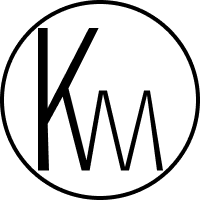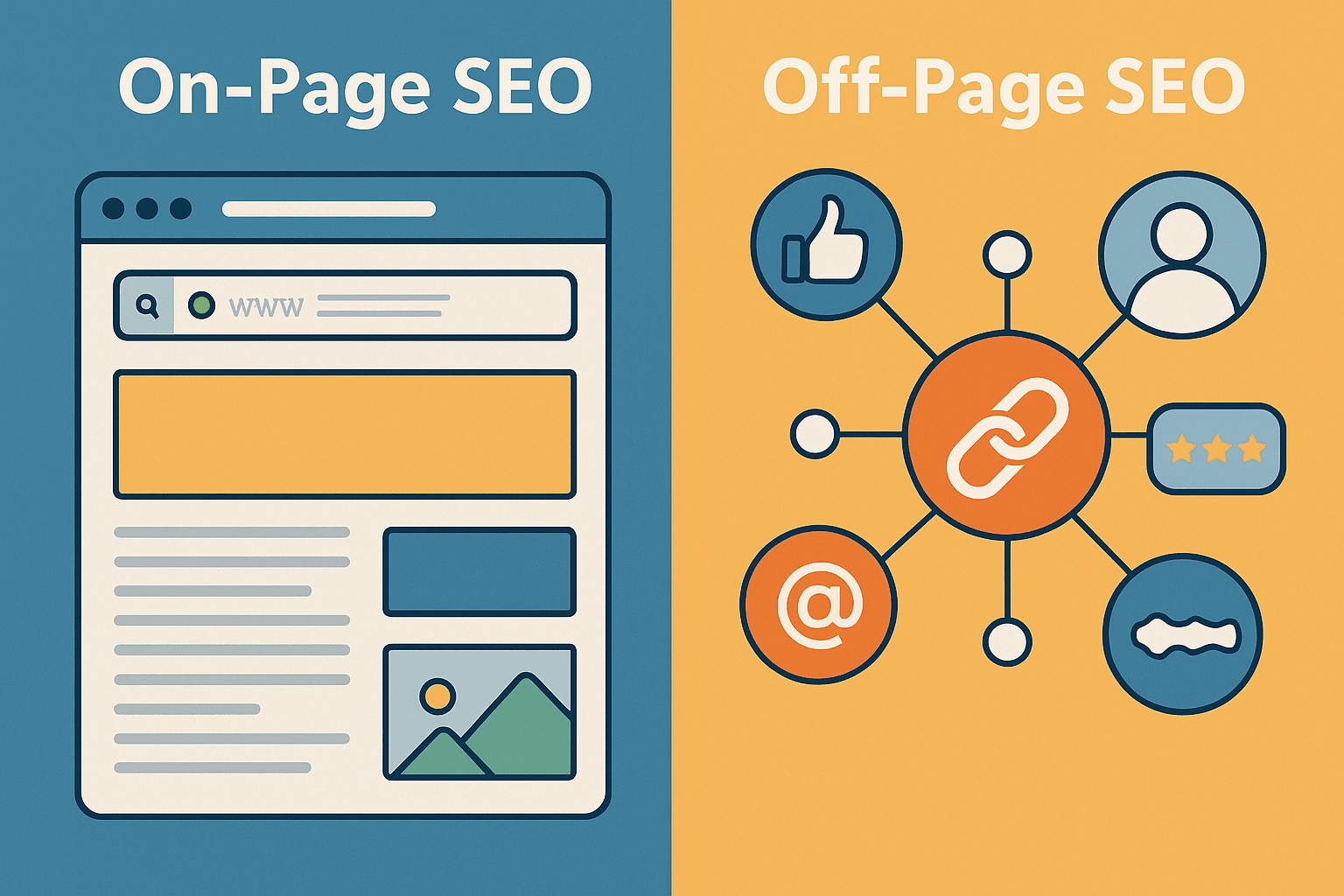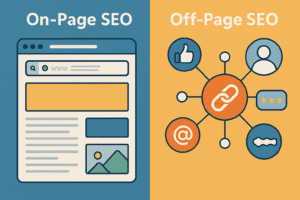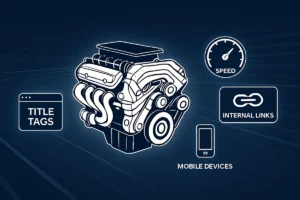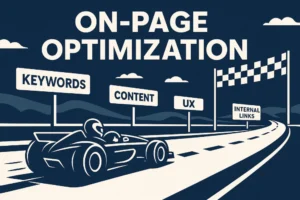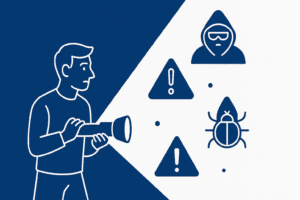SEO Has Two Sides — And You Need Both
Here’s an analogy to familiarise you with On-Page and Off-Page SEO – Imagine you’re opening a brand-new café in your city. You spend weeks designing the space – the lighting is perfect, the menu is on point, the music feels just right. You even invest in a neon sign that glows invitingly in the evening light. This is your on-page SEO – everything your customer sees and experiences the moment they walk in.
But then… no one shows up. Why?
Because nobody knows you exist. No one’s talking about you, there are no reviews, no social media buzz, and definitely no Google Maps ratings. This is where off-page SEO comes in — it’s your reputation in town. It’s the whispers, the recommendations, the links that send people your way.
That’s the heart of the differences between on-page and off-page SEO. One is how you present yourself. The other is how others see you — and both are essential to success.
What is SEO, Anyway?
SEO (Search Engine Optimization) is the art and science of helping your content, products, or services show up when people search for them online. It’s how you turn a random Google user into a site visitor, and — if you’re good — a customer.
At its core, SEO has two major branches:
- On-Page SEO: This is what happens on your website. You control it. It’s your layout, your headlines, your content, your images, your meta tags — the works.
- Off-Page SEO: This is what happens off your website, but still affects your site. Think backlinks, social media shares, mentions on other blogs, or online reviews.
Let’s break that down a little more.
Why Is It Split Into Two?
Because search engines like Google evaluate you on two broad fronts:
- How relevant and well-built is your site? → On-page SEO.
- How trustworthy and popular are you, according to others? → Off-page SEO.
They need both on-page and off-page SEO. A great site with no reputation doesn’t rank. A popular brand with a broken website also doesn’t rank. Google wants the whole package — clean site structure and social proof.
Why You Can’t Just Choose One
A lot of people (especially early-stage businesses) make the mistake of choosing between on-page and off-page SEO.
Some double down on content and page optimization, hoping great content alone will do the trick. Others chase backlinks, spam forums, and pay for shady SEO gigs thinking that off-page signals alone will catapult them to page one.
The truth? SEO isn’t a one-legged stool.
- You need on-page SEO to make your site readable, indexable, and relevant to the search query.
- You need off-page SEO to build authority, credibility, and push your rankings over the edge.
It’s like working out and eating right. One without the other gets you halfway there.
Quick Analogy: Your Storefront vs. Your Street Cred
Let’s bring it back to that café analogy:
| Concept | On-Page SEO | Off-Page SEO |
| Metaphor | Your store layout and design | Your reputation and word-of-mouth |
| You Control? | Yes | Not directly |
| Examples | Site speed, meta tags, content quality | Backlinks, reviews, social shares |
| Goal | Make your site useful and usable | Make your site appear trusted and referenced |
| Outcome | Better relevance and user experience | Higher authority and domain trust |
People don’t just want to see a beautiful café. They want to hear that it’s worth going to. Same with your website. Both on-page and off-page SEO matter!
Modern SEO = Strategy + Balance
The days of keyword stuffing or link buying are (mostly) over. Google’s algorithm is smarter, and users are more discerning.
What works now is balance.
- Want to target a keyword? Make sure it’s used in context (on-page), and that others are linking to your article (off-page).
- Want to launch a new product? Optimize your product page, and get people talking about it on social media or blogs.
- Want more organic traffic? Start with great content, but don’t forget about outreach, relationships, and external validation.
SEO is no longer a checklist. It’s a conversation between your site and the rest of the web.
Here’s Where Most People Go Wrong
Here are some rookie traps you’ll want to avoid:
- Obsessing over on-page elements but never building backlinks.
- Paying for backlinks without building any real value.
- Writing content that sounds “optimized” but is unreadable to humans.
- Ignoring how your site appears when shared on social media.
- Forgetting about internal linking and URL structure.
Remember, the goal isn’t just to impress Google’s bots. Good on-page and off-page SEO is to help people and signal that others trust you too.
A Thought Before We Dive Deeper
You don’t need to be an expert in every SEO tactic to benefit from SEO.
You just need to understand the difference between what you can control (on-page) and what you can influence (off-page). That alone will shape how you approach your content, your promotion, and your visibility online.
In the next section, we’ll define these two branches more clearly.
Before we dive into the nitty-gritty of on-page and off-page SEO, here’s a quick reality check: Most websites aren’t failing because they chose the wrong one — they’re failing because they ignored both.
If your pages aren’t showing up on Google, it’s usually not one big dramatic issue. It’s a bunch of small ones adding up — weak headlines here, missing backlinks there, a sluggish load speed you haven’t noticed since 2021.
That’s exactly what our SEO Services are built to fix.
Whether you’re just starting out or trying to recover lost rankings, we dig into the details most people skip. On-page audits, backlink strategies, content tuning — no fluff, just results.
So as you read this article and recognize weak spots in your own strategy, keep one thing in mind: you don’t have to fix it all alone. Sometimes, getting an expert in your corner makes all the difference.
What is On-Page SEO?
If Off-Page SEO is your reputation, On-Page SEO is your foundation. It’s what your website is built on — everything you directly control to help search engines (and humans) understand what your page is about.
Think of it like setting up your home for guests:
Clean rooms, labeled drawers, comfy lighting, and maybe even your Wi-Fi password written somewhere easy to spot. That’s on-page optimization. You’re making things clear, smooth, and easy to engage with — because nobody likes visiting a messy, slow, or confusing house.
And the best part? You control all of it.
Want to go deeper? Check out our complete On-Page Optimization Guide for step-by-step strategies to boost rankings, clicks, and conversions.
So, What Does On-Page SEO Really Mean?
On-Page SEO refers to all the elements on your website that impact your ranking in search engines. It’s the stuff search engines scan, parse, and score when they crawl your site.
When someone types a query like “best coffee grinders under ₹5000,” Google’s crawling bots are looking at:
- Your page title
- Your headings
- Your content
- Your product descriptions
- Your URL structure
- Your image alt text
- Your internal links
- Your loading speed
- Your mobile responsiveness
- …and even your site security
All of that falls under on-page SEO.
You Control This — So Make It Count
That’s the beauty of on-page: You don’t need anyone else’s help. You don’t need other websites to link to you. You don’t need your readers to tweet about you.
You just need to make your website awesome, and Google will take notice.
Here’s a non-exhaustive breakdown of the core families within On-Page SEO (remember: no deep tactical how-to’s — this is the high-level view):
1. Content Relevance & Quality
This is the beating heart of your site. Search engines are obsessed with matching content to intent.
- Keyword usage: Are you addressing the keyword naturally throughout the content?
- Topical depth: Are you actually answering the user’s question or just scratching the surface?
- Freshness: Is the content outdated or regularly updated?
- Uniqueness: Are you regurgitating stuff from other websites or adding original insight?
In short: Are you giving people a reason to stay and read?
Pro Tip: If your content doesn’t keep a human engaged, Google won’t reward it. Simple.
2. Meta Tags & Title Structure
Search engines don’t see your site the way humans do. They rely on signals — and meta tags are some of the strongest ones.
- Meta Title: What shows up in search results. Should include your keyword.
- Meta Description: A short snippet that tells searchers (and bots) what your page is about.
- Header Tags (H1, H2, etc.): Help structure your content. One H1 per page, then descending hierarchy.
Think of this like labeling rooms in a building. You’re giving Google a map.
3. URL Optimization
Your URLs should be:
- Clean
- Short
- Keyword-rich
- Easy to read
Example:
- Good url – /best-running-shoes-men
- Bad url – /category.php?ID=45%20shoes#ABC
Clear URLs improve crawling and user trust. No one likes mystery meat links.
4. Internal Linking & Navigation
How your pages link to each other matters — a lot.
- Internal links pass SEO juice to other pages on your site
- They help users navigate better
- They keep people on your site longer (reducing bounce rates)
- They make site structure more understandable for search engines
If your site is a city, internal links are your roads.
5. Image Optimization
Search engines can’t “see” images — they read them through:
- Alt Text: Describe what’s in the image
- File Name: Name your files meaningfully (e.g., green-tea-packaging.jpg)
- Compression: Large image files slow down your site
This is especially crucial if you’re running an ecommerce store or blog with lots of visuals.
6. Site Speed & Mobile-Friendliness
This is where the tech side kicks in.
- A slow website = bad rankings.
- A site that breaks on mobile = terrible user experience.
Use tools like Google PageSpeed Insights or GTmetrix to spot problems, and fix them using caching, lazy loading, or image optimization (you already know this if you’re running WordPress + LiteSpeed, for example).
7. Schema Markup (Bonus)
Schema helps you add context to your content. It’s like whispering in Google’s ear:
“Hey, this page is a recipe. These are the ingredients. This is the cook time.”
Rich snippets, star ratings, FAQs — all come from schema.
Common Misconceptions About On-Page SEO
Let’s clear the air a bit.
- “Just use the keyword 20 times and you’ll rank.”
Nope. Overuse gets you penalized. Use it naturally. - “Design doesn’t matter for SEO.”
False. A well-structured, readable layout keeps users engaged — and Google tracks that. - “Meta descriptions aren’t important.”
While not a direct ranking factor, they impact click-through rate — which does affect rankings.
Why On-Page SEO is Non-Negotiable
You could have the most shared article on Reddit, but if your on-page sucks — Google might not even know what the page is about.
On-page SEO is your foundation.
Your grammar, your structure, your lighting.
It’s what makes visitors stay.
And it’s the bare minimum for showing up on Google’s radar.
So while backlinks might give you a push in the rankings, they’ll never save a poorly optimized or irrelevant page.
What is Off-Page SEO?
If On-Page SEO is everything you do within your website to make it Google-friendly, then Off-Page SEO is everything that happens outside your website — the signals that tell Google and the world:
“Hey, this site is legit.”
Where On-Page SEO is about relevance, Off-Page SEO is about authority.
If your website were a person, on-page SEO would be their qualifications, outfit, and communication skills. Off-page SEO would be their reputation — what others say about them when they’re not in the room.
And yes, just like in real life, reputation matters.
Off-Page SEO = Trust Building
Google’s job isn’t just to show relevant content — it has to show trustworthy content.
Imagine searching for “best home remedies for acne.” Google doesn’t want to send you to a random blog that just started yesterday with no external validation. It wants to send you to a site with:
- Backlinks from reputable health blogs
- Social shares from skincare influencers
- Mentions in Reddit threads
- Reviews and citations
That’s off-page SEO at work.
What Falls Under Off-Page SEO?
Here’s a quick overview of the major “families” of Off-Page SEO. These are not techniques — just high-level categories you should be aware of:
1. Backlinks (The Big One)
This is the core of Off-Page SEO — links from other websites pointing to yours.
Not all backlinks are equal. A link from nytimes.com is not the same as a link from shadyblog123.com.
Google evaluates:
- Domain Authority: How trusted is the linking domain?
- Relevance: Is the linking site’s topic related to yours?
- Anchor Text: What text was used in the link?
- Diversity: Are you getting links from many sources or just one?
- Freshness: Are new sites linking to you regularly?
Backlinks are basically votes of confidence. The more high-quality votes you get, the more Google trusts you.
2. Brand Mentions (Linked or Not)
Even without a clickable link, just having your brand mentioned across forums, blogs, or news articles helps.
This is especially true with Google’s increasing focus on entity-based SEO and E-E-A-T (Experience, Expertise, Authoritativeness, Trustworthiness).
Think of it this way: If people are talking about you — Google listens.
3. Social Signals
Social media doesn’t directly boost your rankings (as far as we know), but it amplifies your content, helping it reach people who can link to it.
A well-timed LinkedIn post, tweet, or Instagram reel can lead to:
- Backlinks from bloggers
- Content embeds
- Mentions in podcasts or newsletters
Social visibility → indirect Off-Page signals → SEO win.
4. Online Reviews and Ratings
This is huge for local SEO, but relevant for everyone.
- Google Business reviews
- Trustpilot
- Yelp
- Amazon or product page reviews
- App store ratings
When real users review your product or service on third-party platforms, it strengthens your online reputation. Google notices this.
5. Influencer Endorsements & PR
Getting featured in:
- Podcasts
- YouTube videos
- Roundups (“Top 10 designers to watch in 2025”)
- Press releases or media stories
…all contribute to building your off-page profile. Again, it’s less about quantity and more about quality + relevance.
6. Community Engagement
- Answering questions on Quora or Reddit
- Participating in niche forums
- Engaging in comment sections of relevant blogs
You don’t always need to drop a backlink. Just showing up, being helpful, and associating your brand name with real value builds credibility over time.
Real World Analogy: Off-Page SEO is Your Reputation in the Town
Let’s go back to that café metaphor:
- On-Page SEO is how good your café looks, how easy it is to read the menu, and whether your espresso machine actually works.
- Off-Page SEO is everything outside your walls:
- Who’s recommending you?
- What are people saying on foodie blogs?
- Did someone post your latte art on Instagram?
- Are you showing up in “Top Cafes Near Me” lists?
Even if your food is great, if no one’s talking about you — you’re invisible.
Off-Page SEO is how Google learns you’re worth visiting.
Off-Page ≠ Completely Out of Your Control
A lot of people make the mistake of thinking off-page SEO is about “luck” or “virality.”
Nope. You can influence it:
- Publish content that’s actually worth linking to.
- Reach out for collaborations and guest posts.
- Build relationships in your niche.
- Get listed in directories and review sites.
- Ask happy customers for reviews.
- Share your stuff on social.
You’re not helpless here — you’re just not operating inside your website.
Common Misconceptions About Off-Page SEO
Let’s bust a few myths:
- “Only backlinks matter.”
Wrong. Mentions, social signals, and reviews all count. - “All backlinks are good backlinks.”
Nope. One backlink from a high-authority site > 100 spammy ones. - “You can’t control off-page SEO.”
You can’t force people to link to you, but you can absolutely earn it. - “Social media doesn’t help SEO.”
Directly? Maybe not. Indirectly? Absolutely. Social boosts visibility which increases your chances of off-page signals.
When Off-Page SEO Matters Most
Here’s when to really focus on off-page:
- You’ve nailed your on-page basics, but still aren’t ranking
- You’re entering a competitive niche
- You want to outrank higher-authority domains
- You’ve published amazing content and need it to travel
- You’re launching a product/service and need initial traction
It’s not an “afterthought.” It’s part of the plan.
On-Page vs Off-Page SEO — Key Differences at a Glance
You’ve met the two key players. Now it’s time to see how they stack up side-by-side.
Here’s a quick side-by-side look at how On-Page and Off-Page SEO are fundamentally different:
Comparison Table: On-Page vs. Off-Page SEO
| Aspect | On-Page SEO | Off-Page SEO |
| Definition | Optimization techniques applied directly on your website | External factors and signals that influence your site’s reputation and ranking |
| Main Focus | Content quality, structure, and technical performance | Authority, trust, backlinks, and external validation |
| You Control It? | Fully — you have complete control over everything on your website | Not fully — you can influence but not control how others engage |
| Examples | Meta tags, headers, URLs, internal links, image alt text, mobile responsiveness | Backlinks, brand mentions, reviews, social media shares |
| SEO Goal | Relevance, readability, crawlability, and user experience | Trustworthiness, authority, credibility, and exposure |
| Outcome | Helps search engines understand what your page is about | Helps search engines trust and rank your site higher than competitors |
| Who’s Involved? | You (or your dev/SEO/content team) | Other websites, platforms, users, influencers, publications |
| Time to Impact | Faster — changes can be indexed and reflected quickly | Slower — link building and reputation take time |
| Measurement Tools | Google Search Console, Lighthouse, Screaming Frog, PageSpeed Insights | Ahrefs, Moz, Semrush, Ubersuggest, social listening tools |
| Real-World Analogy | Your shop’s layout, lighting, and service | Word-of-mouth, reviews, and referrals around town |
Let’s Break On-Page and Off-Page SEO Down Further
Now that the table gave you the 10,000-foot view, let’s land the plane and explain what each of these really means in practice.
Control vs Influence
One of the starkest differences lies in control:
- With on-page SEO, you’re in the driver’s seat. You decide how your page is built, how fast it loads, how readable the content is, and what keywords to target.
- With off-page SEO, you’re more like a publicist. You can pitch, nudge, promote — but you can’t force other websites to link to you or users to talk about you.
That’s why on-page is usually the first step for any SEO strategy: control the controllables before chasing external validation.
Focus and Intent
The intention behind on-page and off-page is fundamentally different.
- On-page asks: “Are we delivering content in a way that humans and search engines can understand and enjoy?”
- Off-page asks: “Do others think we’re credible, useful, and worth recommending?”
In Google’s eyes:
- On-page = “Can I crawl and comprehend this?”
- Off-page = “Can I trust and rank this?”
Impact on Ranking
Both influence how you rank, but in different ways:
- A beautifully optimized page with no backlinks might struggle to rank — it looks great, but nobody’s vouching for it.
- A highly-linked page with poor structure or thin content might rank for a while… then drop once user behavior reveals its flaws.
Together, they form a ranking engine:
- On-page sets the relevance baseline
- Off-page determines your authority ceiling
You can’t build a reputation on a broken page. But you also can’t scale a great page if no one knows it exists.
Speed of Results
This is another huge difference that affects strategy.
- On-page SEO can yield quicker wins — update your title tags, compress your images, fix a broken layout, and you might see ranking improvements in days or weeks.
- Off-page SEO requires relationship-building. Getting featured on a blog, mentioned in a roundup, or included in a podcast — that takes time. Then it takes more time for Google to notice and reward that link.
Short-term → Fix your site
Long-term → Earn your reputation
Measurement Tools
Here’s where a lot of beginners get confused:
- Tools like Google Search Console and PageSpeed Insights help you monitor on-page health.
- Tools like Ahrefs, Moz, and Semrush track backlinks, domain authority, and referring domains — i.e., off-page signals.
Trying to track off-page using only GSC? You’re missing half the picture.
Visual Analogy Revisited: The Storefront and the Buzz
Let’s really bring it home:
On-Page SEO = Your Storefront
- Clean windows
- Clear signage
- Great lighting
- Easy-to-navigate layout
- Helpful, readable menu
You walk by and instantly know what they offer.
Off-Page SEO = The Buzz Outside
- The blogger who reviewed your store
- The Instagram food influencer tagging your dessert
- The friend who recommended your place to their WhatsApp group
- The travel site that listed you in “Top Cafés in Bangalore”
You trust it more… because others trust it.
Why You Shouldn’t Prioritize One Over the Other
Some people try to “hack” SEO by focusing only on one side:
- “Let me just get a ton of backlinks and ignore the site itself”
- “Let me just keep optimizing meta tags and not worry about outreach”
Both fail eventually. Here’s why:
- On-page-only strategy = invisible site
- Off-page-only strategy = unsustainable wins
Search engines are smarter than ever. They look at the whole picture, including relevance, reputation, and behavior signals. You can’t fool them anymore. But you can align with them — and that means working both sides, on-page and off-page SEO, in sync.
Why You Can’t Ignore Either: When to Focus on On-Page or Off-Page SEO
Let’s say you’re building a brand new website. You’ve set it up with decent content, the design is slick, and the pages load pretty fast. But traffic? Dead quiet.
Or maybe it’s the other way around. You’ve somehow managed to get a bunch of backlinks — maybe your product got featured on a big site or some influencer shouted you out. But when people land on your site… bounce. Gone in 10 seconds. Rankings don’t stick. Conversions? Non-existent.
Both of these are classic cases of imbalanced SEO. One side is trying to carry the entire weight of your visibility — and it’s just not enough.
This is where most businesses get stuck. They do one well, completely ignore the other, and then wonder why they’re not ranking despite “doing SEO.”
Let’s break it down:
On-Page SEO Builds the House. Off-Page SEO Gets People to Visit It.
If your website were a house…
- On-page SEO is the blueprint, the interior design, the paint job, and the plumbing.
- Off-page SEO is your reputation in the neighborhood. It’s the real estate agent recommending you. The good Yelp reviews. The friends telling friends.
No one wants to visit a house with leaking pipes.
No one trusts a house that looks great but no one’s heard of.
See the problem?
When Should You Prioritize On-Page SEO?
Here are situations where on-page should be your first move:
1. You Just Launched a New Website
If you’re starting from zero, forget about backlinks for a moment. Your first job is to:
- Structure your site logically
- Write clean, helpful, optimized content
- Make your site crawlable, fast, and mobile-friendly
Why? Because Google won’t even rank you until it understands what your site is about.
Trying to earn backlinks without first fixing your titles, tags, and URLs is like inviting guests to a party where the house is still under construction.
2. You’re Getting Traffic But Not Ranking Well
This usually means your content exists, but it doesn’t match search intent or lacks proper optimization.
You might be:
- Using the wrong keywords
- Burying your value in walls of text
- Lacking internal links
- Ignoring meta data
- Letting your site speed tank
A simple on-page audit can often reveal bottlenecks holding your rankings back.
3. You’ve Got a High Bounce Rate
If people land on your page and bounce instantly, Google takes the hint.
This might not be a content problem — it could be design, readability, or page structure. Again, on-page SEO.
When Should You Prioritize Off-Page SEO?
Off-page is the lever you pull when you’ve already got a solid website — but you’re still not climbing the SERPs.
1. You’ve Nailed On-Page But Still Aren’t Ranking
You might be the best-kept secret in your niche. But if no one’s linking to you? You’re invisible.
Time to get visible. Reach out. Collaborate. Get mentioned. Earn links.
2. You’re in a Competitive Niche
If you’re competing in spaces like finance, health, law, or tech — on-page alone won’t cut it. Everyone has good content.
Google needs to see that others vouch for you. That’s when high-authority backlinks make a difference.
3. You’re Trying to Rank Product Pages or Commercial Content
Blog posts can rank with good content alone. But salesy pages? Not so easy.
Google’s trust levels are lower for product and service pages. You’ll often need strong off-page signals (backlinks from reviews, mentions in listicles, etc.) to climb the ranks.
Strategic Use Cases: Real-World Scenarios
Let’s make it practical.
Use Case 1: Blogger Launching a New Niche Site
Focus First On: On-Page
Why: You need structure, optimized articles, and topic clusters before anyone will link to you.
Use Case 2: An Established Site With Great Content, But Flat Organic Growth
Focus On: Off-Page
Why: You’ve likely hit your on-page ceiling. You need fresh authority signals to break into higher positions.
Use Case 3: Local Business With Poor Rankings But High Footfall
Focus On: Local SEO (mix of both)
Why: You probably need review management (off-page) and better GMB optimization and content targeting (on-page).
Use Case 4: E-commerce Site With 100+ Products
Focus On: On-Page + Technical
Why: Poor site speed, duplicate content, and unoptimized product pages are likely killing you. Off-page won’t fix that.
On-Page and Off-Page SEO Are Not Enemies — They Work Together
This isn’t a battle. It’s a dance.
- On-page makes sure your site is eligible to rank.
- Off-page helps your site become competitive enough to win.
Neither works at full power without the other.
You might rank with just on-page.
You might appear trustworthy with just off-page.
But to win, you need both.
Here’s a Simple Way to Audit Your Balance
- On-Page Audit Checklist:
- Are your pages targeting the right keywords?
- Is your content helpful and structured?
- Is your site mobile-friendly and fast?
- Are internal links connecting related content?
- Do all pages have optimized meta titles and descriptions?
- Off-Page Audit Checklist:
- How many referring domains link to you?
- What’s your domain authority or domain rating?
- Have you been mentioned in relevant blogs?
- Are people talking about your brand on social media?
- Are you listed in relevant directories?
If one side feels weak — now you know what to prioritize.
Common Myths About On-Page and Off-Page SEO
You’d think by now — after decades of search engines, algorithm updates, and Google’s AI overlords — people would stop falling for outdated SEO advice.
But alas… the SEO streets are still filled with half-truths, recycled nonsense, and straight-up myths that refuse to die.
So let’s put them to rest — once and for all.
On-Page and Off-Page SEO MYTH #1: “Just Write Great Content and You’ll Rank.”
You’ll see this everywhere, especially on Twitter threads from new content creators.
“Google rewards great content. Just write quality stuff, and traffic will follow.”
Reality: Great content is the bare minimum.
It’s like saying, “Just be hot and you’ll find love.” Eh. It helps. But it’s not enough.
If you:
- Don’t optimize for the right keywords,
- Don’t have internal linking,
- Don’t promote your post…
…it’s just going to sit there collecting digital dust.
Truth: Content is king, but SEO is the kingdom. Build both.
On-Page and Off-Page SEO MYTH #2: “Backlinks Are All That Matter.”
This one’s the classic bro marketer pitch:
“Buy our 500-backlinks-a-month package and explode your rankings!”
They’re not wrong about backlinks being powerful. But relying only on off-page SEO is like buying your way into a party and then showing up wearing a trash bag.
If your page doesn’t load fast, doesn’t answer the search query, or looks shady — all those backlinks will do is bring people to a bad experience.
Truth: Backlinks boost authority, but they won’t save a poorly optimized page.
On-Page and Off-Page SEO MYTH #3: “Meta Descriptions Don’t Matter Anymore.”
Some SEO folks love to parrot this:
“Google rewrites them anyway, so who cares?”
Yes, Google does sometimes override your meta description.
No, that doesn’t mean you should leave it blank or let Yoast autopilot it.
A well-crafted meta description:
- Improves CTR
- Gives users clarity
- Adds professionalism
Even if it’s not a direct ranking factor, it affects behavior signals — which are.
Truth: Meta descriptions aren’t dead — lazy writing is.
On-Page and Off-Page SEO MYTH #4: “You Need a 100/100 Lighthouse Score to Rank.”
Nope. A perfect technical score won’t guarantee you better rankings.
Yes, site speed matters — but not to the point where you obsess over shaving 200ms and breaking your layout just to make Google PageSpeed happy.
We’ve seen plenty of high-ranking pages that score 60–70, because their content is useful, their backlinks are solid, and users engage.
Truth: Performance matters. But Google won’t ignore you just because you scored a 91 instead of 98.
On-Page and Off-Page SEO MYTH #5: “Social Media Links Don’t Help SEO.”
This one’s half-true — and that’s what makes it dangerous.
Google has said that social signals aren’t direct ranking factors. But guess what?
- Social exposure → more eyeballs
- More eyeballs → more chances of shares
- More shares → more backlinks
- More backlinks = better rankings
Truth: Social media drives discoverability. Discoverability drives backlinks. The math checks out.
On-Page and Off-Page SEO MYTH #6: “Off-Page SEO Is Out of Your Control.”
Just because you can’t directly manipulate it doesn’t mean you’re powerless.
You can:
- Reach out to blogs
- Pitch yourself on podcasts
- Build sharable content
- Offer value in forums
- Encourage satisfied customers to review you
- Use HARO or Terkel for media features
You’re not throwing pebbles into a void. You’re building relationships — and that’s influence.
Truth: Off-page is like PR — indirect, but not helpless.
On-Page and Off-Page SEO MYTH #7: “Keyword Stuffing Still Works.”
This is 2007 calling. It wants its SEO strategy back.
You’ve seen the pages:
“This is the best plumber in Mumbai. If you need a plumber in Mumbai, call the best plumber Mumbai has to offer because we’re the #1 plumber Mumbai plumber plumber plumber…”
No one reads it. No one links to it. And Google isn’t dumb anymore.
Truth: Use your keyword strategically. Not like you’re being paid per mention.
On-Page and Off-Page SEO MYTH #8: “SEO Is a One-Time Thing.”
This one kills me.
People will do one round of optimization and then… vanish.
No updates. No new content. No backlink tracking. Just vibes.
And six months later, when rankings tank:
“SEO doesn’t work.”
Of course it doesn’t. You left it to rot.
Truth: SEO is ongoing. It’s not a checkbox — it’s a system you keep tuning.
On-Page and Off-Page SEO MYTH #9: “Internal Links Don’t Matter — Focus on External Ones.”
Internal links:
- Help Google crawl and understand your site
- Distribute authority across pages
- Keep users engaged longer
They’re one of the easiest on-page wins — and yet wildly underused.
Truth: Internal links are your secret weapon. Ignore them at your peril.
On-Page and Off-Page SEO MYTH #10: “You Have to Blog Every Day to Rank.”
You don’t need to post daily. You just need to post consistently and strategically.
One killer blog post a week — optimized and promoted properly — will outdo 20 meh posts you rushed through just to “stay active.”
📌 Truth: Quality > Quantity. Consistency > Burnout.
Final Word on On-Page and Off-Page SEO Myths
SEO is like fitness. There’s always a new “hack” or guru pushing a magic method.
But the fundamentals of on-page and off-page SEO don’t change:
- Build a site worth visiting.
- Make it easy to understand.
- Earn trust and attention from others.
- Keep refining.
If you avoid these myths and focus on what matters, you’ll be ahead of 80% of your competition.
By now, you’ve probably spotted your blind spots — maybe your pages are solid but you’re not building authority, or maybe your content isn’t as optimized as it should be. That’s the curse of SEO: when it’s done right, it feels invisible. When it’s off? You feel it everywhere — in traffic dips, poor rankings, and zero leads.
If you’re ready to stop guessing and actually move the needle, it might be time to call in backup. Our SEO services are designed to do exactly that — diagnose what’s not working, strengthen what is, and build a sustainable path to growth.
We don’t just chase rankings. We focus on site structure, content clarity, authority building, and making sure every piece of your SEO puzzle fits where it should. And we tailor it all to your business, not just some one-size-fits-all checklist.
So whether you’re looking to sharpen your on-page game, expand your backlink profile, or just stop throwing content into the void — we’ve got you.
Final Thoughts on On-Page and Off-Page SEO and Next Steps: Balance Both or Stay Invisible
So here you are.
You’ve just read through the full breakdown of the differences between On-Page and Off-Page SEO. You understand what they are, how they work, why both matter — and where people tend to mess it all up.
And if you’re like most site owners or marketers, you might be thinking:
“Okay, cool… but what do I actually do with this?”
Let’s talk about that.
Start With This: Audit Your Current On-Page and Off-Page SEO Balance
No two websites start from the same place. Some are beautifully built but lack reach. Others are internet-famous but fall apart under the hood.
Here’s a quick way to self-assess:
If You’re New:
- Focus 80% of your time on on-page SEO
- Create content that targets keywords people actually search for
- Set up your meta tags, structure, speed, and internal links
- Make sure your site is technically clean before you go link-hunting
If You’ve Been Publishing for a While:
- Pull a list of your top-performing pages
- Check which ones aren’t ranking as well as they should
- Improve their on-page elements first
- Then work on earning relevant backlinks to them
If You Have a High Domain Rating but Low Traffic:
- You’ve likely won the off-page battle but are weak on-page
- Rewrite outdated content
- Improve readability and keyword relevance
- Plug in internal links and re-check meta descriptions
If You’ve Been Relying Only on Content:
- Sorry to break it to you: SEO ≠ just writing
- Start promoting your content. Reach out for guest posts. Get social
- Consider partnerships, podcast features, or press outreach
- Start earning trust, not just publishing text
Actionable Steps You Can Take Right Now
Here’s what you can do in the next 48 hours:
- Run a site audit.
Use tools like Ubersuggest, Ahrefs, or Screaming Frog to find technical issues and keyword opportunities. - Pick 1 page to improve.
Choose a blog post, product page, or service page and optimize:- The title
- Headings
- Meta description
- Internal links
- Load speed
- Pitch one backlink opportunity.
Could be a guest post, a niche blog, or even a local listing. Just start. - Track your changes.
Use Google Search Console to monitor how your edits affect impressions and clicks.
Final Analogy to Remember
SEO isn’t a game of brute force. It’s more like growing a reputation in a new town:
- On-page SEO is how you dress, how clearly you speak, and whether you hold eye contact.
- Off-page SEO is what others say about you when you leave the room.
You need both on-page and off-page SEO.
Dress well. Speak clearly. But also — be the kind of site people want to talk about.
One Final Question for You
Where’s the biggest gap in your current SEO strategy — control or credibility?
Be honest. Start there.
Because the only thing worse than doing no SEO… is doing it blind.

I design high-performing WordPress + Elementor websites and WooCommerce stores that rank on Google and convert visitors into customers. At Katmantra Web Design and SEO, I combine clean design with smart SEO so your site works as hard as you do.
